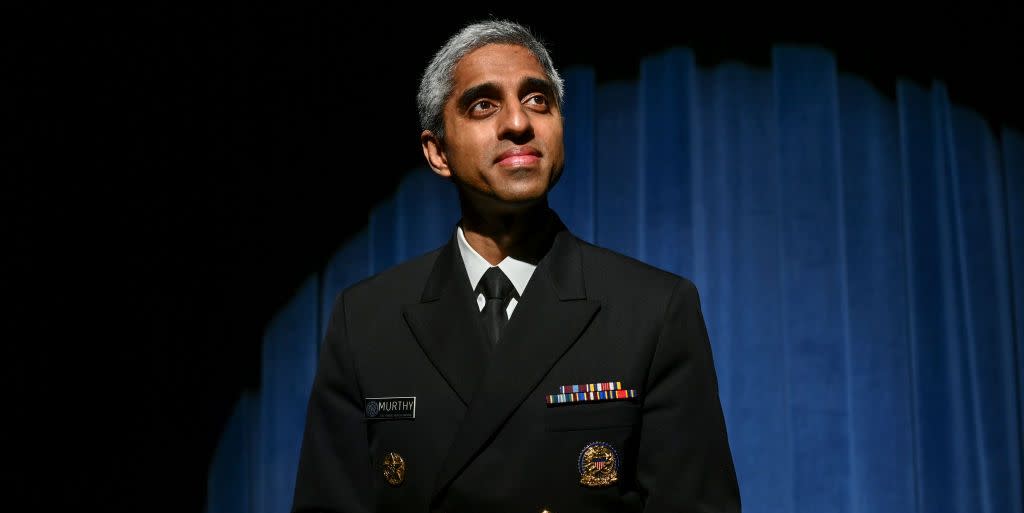The U.S. Surgeon General Reveals the Mental Health Lessons He Learned the Hard Way

- Oops!Something went wrong.Please try again later.
- Oops!Something went wrong.Please try again later.
Dr. Vivek Murthy was having a tough time. After being nominated to serve as United States Surgeon General under President Obama in 2013, the decorated doctor found himself in a lengthy (and contentious) Senate confirmation process for much of 2014. The official yet highly political proceedings were ripe with attacks on Dr. Murthy's public health stances, professional qualifications, and character—all on the world's stage.
“It was my very first experience doing something in the public eye—and it was tough," Dr. Murthy recently told Men's Health. "It was also my first experience hearing all kinds of people who didn’t know me say all kinds of things about me."
During the year-long arduous process, Dr. Murthy says he withdrew from those closest to him. He feared the stalled confirmation process meant he was failing—failing his family, friends, mentors. He now blames his emotional detachment at the time on shame.
“That word—'shame'—I want to underscore," he said. "It eats away at us. We’ve all experienced it from time to time, and it prevents us from reaching out exactly when we need to—and that’s what happened to me.”
He eventually was narrowly approved by the Senate, gaining the title of Surgeon General under President Obama. (He would later regain the seat in March 2021 under President Biden.) But Dr. Murthy says it took dedicated effort from his support system to pull him “out of a dark place" when the dust settled, gifting him the ability to see himself clearly again.
“They helped me quiet the noise and see myself and the world for what it really was," he said. "I don’t know if I would have gotten through that time without them.”
It isn't common to hear a public figure get candid about their experiences in the public eye, especially when that experience puts a toll on their mental health. But Dr. Murthy—who recently shared his perspective on men's mental health on the Men's Health Instagram Live show Friday Sessions—isn't one to shy away from hard conversations around mental wellbeing. It's part of what makes his work in mental health so notable and tide-shifting, defining a significant portion of his work as surgeon general over the years.
Dr. Murthy is an expert in loneliness and its impact on men's mental health; topics his book, Together: The Healing Power of a Human Connection In a Sometimes Lonely World, delves into deeply. He says isolation, like the type he experienced when withdrawing several years ago, often leads to loneliness and emotional turmoil. Men are often hesitant to claim loneliness or related emotions, possibly because they don't realize how common feelings of loneliness are.
“[Loneliness] is an incredibly common feeling that people have. It’s nothing to be ashamed of," he said. "It’s kind of like hunger or thirst. It’s a signal that our body send us that we’re missing something that we need for survival."
According to Dr. Murthy, many men leave feelings of isolation unaddressed, distancing themselves from emotion to maintain a definition of "manhood" hinging on being stoic, independent, and restrained.
"The truth is that doesn’t always serve us well," Dr. Murthy said. "There’s no sense in suppressing part of our humanity [like] our emotions. And also there’s no shame in needing other people. As human beings, we’ve evolved over thousands of years to need each other. That’s why people have prospered and thrived in communities over thousands of years as opposed to prospering and thriving solely as individuals."
To rewrite the narrative around masculinity and emotional awareness, Dr. Murthy believes it's essential to teach young boys to embrace their emotions through modeling. And that means encouraging men to champion vulnerability and open up about emotional struggles, crafting a healthier type of masculinity together.
“In our hearts, we have to get to the point where we understand as men that being in touch with our emotional side, expressing our emotions, and acknowledging that we may struggle emotionally from time to time is not a source of weakness," Dr. Murthy said. "That is not evidence that you are less of a man. That’s evidence that you have insight and that you know true strength is both physical and mental."
When it comes to taking control of your own mental wellbeing, Dr. Murthy names three main habits as having a noticeable impact on mental health: controlling your digital diet, maintaining meaningful social connections, and prioritizing physical activity.
“We are at our best when we can acknowledge the entirety of who we are—our mental, physical and emotional parts,” he said. “And we are also at our best when we lean on other people and when we allow them to lean on us. Because we truly are better together.”
Watch the full Friday Sessions interview with Dr. Murthy below:
You Might Also Like

